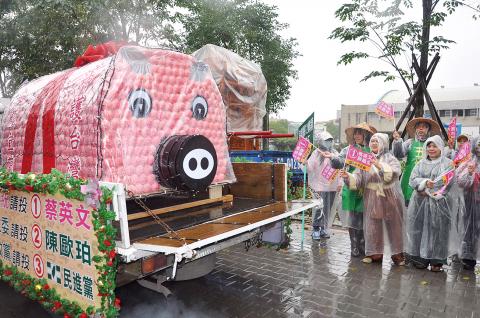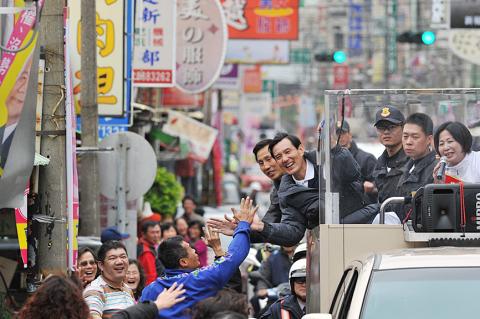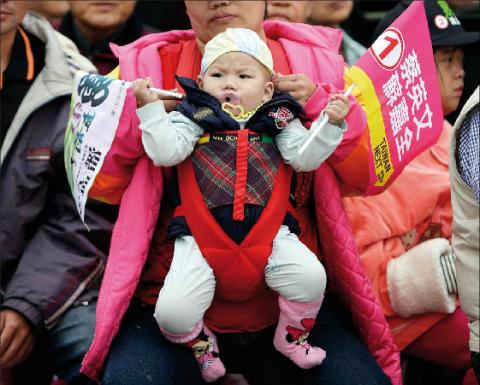Election fever was ratcheted up a notch yesterday on “Super Saturday” as the three presidential candidates criss-crossed the nation canvassing for votes, before they rounded up their days with campaign rallies.
President Ma Ying-jeou (馬英九), who is seeking re-election, stepped up his campaign efforts in Yunlin and Changhua counties, visiting markets and temples as he sought support in the pan-green strongholds.
Ma attracted a large crowd during his first stop at the largest market in Douliou City (斗六) in Yunlin County as vendors and supporters packed the narrow streets and presented him with foods that represent good fortune, including zongzi (粽子), steamed buns and Chinese radishes.

Photo: CNA
He later joined his running mate, Premier Wu Den-yih (吳敦義), in a bullet-proof motorcade as they waved to local residents.
Supporters showed their passion by making “V” hand gestures as the motorcade drove by. However, along the way, Ma and Wu came across supporters of Democratic Progressive Party (DPP) presidential candidate Tsai Ing-wen (蔡英文), who waved Tsai’s campaign flags along the road in the predominantly agricultural area, where the DPP has long enjoyed popularity.
During a visit to Dounan Agricultural Association, Ma defended the government’s measures in promoting the development of the agricultural industry and said the cross-strait Economic Cooperation Framework Agreement (ECFA) would continue to help expand the scope of Chinese markets for local businesses.

Photo: AFP
“Most of the 18 agricultural products exported to the mainland enjoy zero-tariff treatment thanks to the ECFA. Expanding into the Chinese market will continue to boost the sale of agricultural products and improve the lives of our farmers,” he said.
Ma’s motorcade later traveled to Changhua County as he continued his campaign trip in the south.
Joining local Chinese Nationalist Party (KMT) legislative candidates as they sought to boost their election support, Ma accused Tsai of flip-flopping on the ECFA. He also defended his cross-strait policies as the best way to maintain the “status quo” after criticism from the DPP over major business leaders expressing support for the so-called “1992 consensus.”

Photo: Jason Lee / Reuters
“Chairperson Tsai was critical of the ECFA last year and said the local economy would be damaged because of the pact. Now she changed her tone and said she will accept the economic pact … Taiwan would be put in danger if cross-strait relations are handled by a leader who flip-flops about cross-strait policies,” he said.
Ma reiterated his criticism of Tsai’s cross-strait policies later during a large campaign rally in Changhua City, describing her proposed “Taiwan consensus” as a vague concept that lacks substance.
That rally drew thousands of supporters who packed into the campaign site. The KMT mobilized at least 30,000 party members to join the event, according to KMT Culture and Communication Committee director Chuang Po-chun (莊伯仲).
Amid cheers from supporters, who waved Ma’s campaign flags and chanted “Ma Ying-jeou Dong Suan [凍蒜, meaning getting elected in Taiwanese],” Ma questioned Tsai’s ability to lead and promised to bring a “golden decade” if re-elected.
“Taiwan needs a leader who can handle delicate cross-strait relations and help the country survive the European debt crisis. Chairperson Tsai is not ready, but we are,” he said. “The nation’s developments are still under way and it would be unwise to change the leader now.”
Ma ended the evening with another campaign rally in New Taipei City (新北市), where he promised to carry out his policy platforms if re-elected.
Meanwhile, Tsai yesterday began what she called the “last mile” trip in her bid for the presidency in the south for a final week of canvassing before Saturday’s elections.
Tsai and her running mate, Su Jia-chyuan (蘇嘉全), launched their trip at Pingtung County’s port township of Donggang (東港), hoping that the motorcade traversing the country would be able to generate more support.
Tsai and Su raised a sail and a banner with the slogan “Taiwan’s first female president” in a ceremony marking the beginning of the trip at an oceanside park.
“We chose here, where the traditional King Boat Festival was held to chase away illness, to start our dash in the last mile to victory,” Tsai said.
She said she is confident she can win the election and that the DPP would lead Taiwan into a new age of cooperation between political parties and political stability under the principle of consociational democracy and a grand coalition government when it returns to power.
More than a decade of political dueling has hurt Taiwan’s development, which was why she advocated tolerance, solidarity and a democratic process of consensus-building, she said.
“The true meaning of democracy is more than the majority defeating the minority. It also lies in a democratic process that can integrate positive forces and transform it into a power to drive the country forward,” she told the supporters.
Holding a majority does not necessarily mean stability, she said, adding that Ma and his KMT had forgotten what democracy is all about, despite holding a solid majority in the legislature and being given a strong mandate after Ma’s landslide win in the 2008 election.
Ma has neither listened to the people’s voice nor respected the opposition party during his term in office, she said.
If she were elected, Tsai said her administration would be bipartisan, because “Taiwan is not a country of the DPP or the KMT. It is a country that belongs to everyone.”
From Donggang, Su proceeded to the east coast counties of Taitung and Hualien.
Tsai visited Greater Kaohsiung in the afternoon and received warm support in Fongshan (鳳山), Cianjhen (前鎮) and Siaogang (小港), where many supporters lined the street and welcomed Tsai with firecrackers and cheering.
Tsai later shared the stage with other DPP heavyweights at another rally in Greater Tainan in the evening, where the DPP said a crowd of about 100,000 turned up.
People First Party Chairman James Soong’s (宋楚瑜) campaign schedule also took him to Greater Tainan yesterday where he held a campaign rally last night before canvassing for voter support at a night market.
Criticizing Ma as a president who is incompetent and unaware of people’s suffering, Soong said that what people need is a president who can take good care of his people by employing government resources and using its talent pool more effectively.
PFP spokesman Wu Kun-yu (吳崑玉) on Friday said that Soong has been busy lately with numerous private appointments with some of his supporters who are unwilling to attend public events.
His running mate, Lin Ruey-hsiung (林瑞雄), meanwhile, left Taiwan on Wednesday for a four-day visit to Bhutan and is scheduled to return to Taiwan tomorrow.
Additional reporting by staff writer

Taiwan is gearing up to celebrate the New Year at events across the country, headlined by the annual countdown and Taipei 101 fireworks display at midnight. Many of the events are to be livesteamed online. See below for lineups and links: Taipei Taipei’s New Year’s Party 2026 is to begin at 7pm and run until 1am, with the theme “Sailing to the Future.” South Korean girl group KARA is headlining the concert at Taipei City Hall Plaza, with additional performances by Amber An (安心亞), Nick Chou (周湯豪), hip-hop trio Nine One One (玖壹壹), Bii (畢書盡), girl group Genblue (幻藍小熊) and more. The festivities are to

Auckland rang in 2026 with a downtown fireworks display launched from New Zealand’s tallest structure, Sky Tower, making it the first major city to greet the new year at a celebration dampened by rain, while crowds in Taipei braved the elements to watch Taipei 101’s display. South Pacific countries are the first to bid farewell to 2025. Clocks struck midnight in Auckland, with a population of 1.7 million, 18 hours before the famous ball was to drop in New York’s Times Square. The five-minute display involved 3,500 fireworks launched from the 240m Sky Tower. Smaller community events were canceled across New Zealand’s

‘IRRESPONSIBLE’: Beijing’s constant disruption of the ‘status quo’ in the Taiwan Strait has damaged peace, stability and security in the Indo-Pacific region, MOFA said The Presidential Office yesterday condemned China’s launch of another military drill around Taiwan, saying such actions are a “unilateral provocation” that destabilizes regional peace and stability. China should immediately stop the irresponsible and provocative actions, Presidential Office spokeswoman Karen Kuo (郭雅慧) said, after the Chinese People’s Liberation Army (PLA) yesterday announced the start of a new round of joint exercises around Taiwan by the army, navy and air force, which it said were approaching “from different directions.” Code-named “Justice Mission 2025,” the exercises would be conducted in the Taiwan Strait and in areas north, southwest, southeast and east of Taiwan

UNDER WAY: The contract for advanced sensor systems would be fulfilled in Florida, and is expected to be completed by June 2031, the Pentagon said Lockheed Martin has been given a contract involving foreign military sales to Taiwan to meet what Washington calls “an urgent operational need” of Taiwan’s air force, the Pentagon said on Wednesday. The contract has a ceiling value of US$328.5 million, with US$157.3 million in foreign military sales funds obligated at the time of award, the Pentagon said in a statement. “This contract provides for the procurement and delivery of 55 Infrared Search and Track Legion Enhanced Sensor Pods, processors, pod containers and processor containers required to meet the urgent operational need of the Taiwan air force,” it said. The contract’s work would be